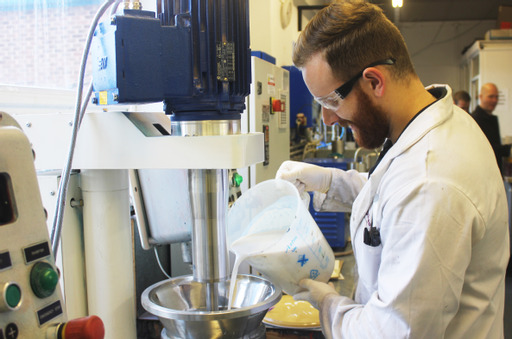A Manchester paint manufacturer is aiding the growth of the North West’s £10bn chemical industry with the support of Made Smarter.
HMG Paints is one of dozens of SME chemical manufacturers capitalising on the opportunities that digitisation offers through the Made Smarter Adoption Programme in the North West, a collaboration between UK government and industry designed to support the increased use of digital technologies.
Through impartial expert technology advice and match funding on technology projects, digital transformation workshops to help manufacturers take their first steps, a leadership programme, digital technology internships, and skills development, the programme is helping businesses in the sector increase productivity, achieve sustainable growth, and create new high value jobs.
Working with Made Smarter, HMG, an independent paint manufacturer which produces more than 3M litres each year from its factory in Manchester, was able to digitalise a time-consuming, paper-based process which increased capacity and enabled it to cope with the surge in demand during the pandemic.
Rebecca Falder, Quality Systems Manager at the 90-year-old, fourth generation family business, said:
“Made Smarter’s Digital Transformation Workshop process was fantastic. We were able to streamline our thoughts, categorise and prioritise, and create a digital roadmap. It helped us identify our biggest challenge in our dispatch process, and with the right technology investment saved 40% of the time and reduced errors significantly.”
Armed with a digital roadmap, manufacturers can grow progressively and sustainably, avoiding the wasted time, effort and money that comes from adopting technologies in a disparate way.
Other chemical manufacturers have benefited from the Made Smarter Leadership Programme, designed to equip SME managers and directors with the strategic view and the skills needed to successfully pursue smarter manufacturing.
To drive the adoption of digital technology in the North West, Made Smarter is also forging a partnership with the Chemical Industries Association (CIA), the leading national trade association representing chemical and pharmaceutical companies, including key clusters in the North West, North East, and Yorkshire and Humber.
Commending the impact of the programme, Ian Cranshaw, Head of Regional Affairs for the CIA, said: “The success of the Made Smarter Adoption Programme in the North West has demonstrated the value of targeted support for SME manufacturers to help them take those first steps on their digitalisation journeys. The roll out of the innovative programme to the West Midlands, North East, and Yorkshire and the Humber regions, expands that support to other key UK chemical clusters.
“At the Chemical Industries Association we have been studying the impact and potential of digitisation for some time, having set out our latest thinking in our Digitisation in the Chemical Industry report. Investment in digital technologies for plants is increasing. However there are several key barriers preventing faster and more widespread adoption and in order to overcome these, we have urged the Government to implement the findings of the Made Smarter review.”
Made Smarter, which has supported businesses to deliver an additional £176 million in gross value added, is now keen to reach more chemical manufacturers and has produced a free guide to help demystify digitalisation and drive technology adoption.
The downloadable document includes topics such as how digital tools can help tackle key business challenges including: achieving consistent quality, complying with regulations, managing waste and pollution, identifying supply chain trends, and supporting production planning.
Donna Edwards, North West Adoption Programme Director at Made Smarter, said: “The North West is made up of hundreds of chemical makers who create a variety of products which impact virtually every aspect of our lives, such as soap, paint and fuel.
“The sector is adopting digital technologies at a faster rate than other sectors in a race to stay competitive, adapt to strict quality standards, compliance and reporting responsibilities, and reduce its environmental impact through waste and emissions.
“However, in highly regulated manufacturing, jumping feet first is very risky and upgrading to new technologies can seem like a complex and daunting task.
“To help demystify digitalisation and help SMEs to their first step, we have produced some crucial guidance as well as explained why implementing digital tools is such a priority in this sector.”







